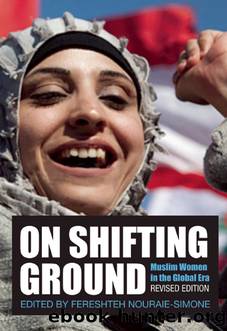On Shifting Ground by Fereshteh Nouraie-Simone

Author:Fereshteh Nouraie-Simone [Nouraie-Simone, Fereshteh]
Language: eng
Format: epub
ISBN: 9781558618565
Publisher: The Feminist Press at CUNY
DOCILITY AND AGENCY
In order to elaborate my theoretical approach, let me begin by examining the arguments of Judith Butler, who remains, for many, the preeminent theorist of poststructuralist feminist thought, and whose arguments have been essential to my own work. Central to Butlerâs analysis are two insights drawn from Michel Foucault, both quite well known by now. Power, according to Foucault, cannot be understood solely on the model of domination, as something possessed and deployed by individuals or sovereign agents over others, with a singular intentionality, structure, or location that presides over its rationality and execution. Rather, power is to be understood as a strategic relation of force that permeates life and produces new forms of desires, objects, relations, and discourses.34 Second, the subject, argues Foucault, does not precede power relations, in the form of an individuated consciousness, but is produced through these relations, which form the necessary conditions of its possibility. Central to his formulation is what Foucault calls the paradox of subjectivation: the very processes and conditions that secure a subjectâs subordination are also the means by which she becomes a self-conscious identity and agent.35 Stated otherwise, one may argue that the set of capacities inhering in a subjectâthat is, the abilities that define her modes of agencyâare not the residue of an undominated self that existed prior to the operations of power but are themselves the products of those operations.36 Such an understanding of power and subject formation encourages us to conceptualize agency not simply as a synonym for resistance to relations of domination, but as a capacity for action that specific relations of subordination create and enable.
Drawing on Foucaultâs insights, Butler asks a key question: âIf power works not merely to dominate or oppress existing subjects, but also forms subjects, what is this formation?â37 By questioning the prediscursive status of the concept of subject and inquiring instead into the relations of power that produce it, Butler breaks with feminist analysts who formulated the issue of personhood in terms of the relative autonomy of the individual from the social. Thus the issue for Butler is not how the social enacts the individual (as it was for generations of feminists) but what the discursive conditions are that sustain the entire metaphysical edifice of contemporary individuality.
Given Butlerâs theory of the subject, it is not surprising that her analysis of performativity also informs her conceptualization of agency; indeed, as she says, âthe iterability of performativity is a theory of agency.â38 To the degree that the stability of social norms is a function of their repeated enactment, agency for Butler is grounded in the essential openness of each iteration and the possibility that it may fail or be reappropriated or resignified for purposes other than the consolidation of norms. Since all social formations are reproduced through a reenactment of norms, this makes these formations vulnerable because each restatement/reenactment can fail. Thus the condition of possibility of each social formation is also âthe possibility of its undoing.â39
There are several points on which Butler departs from the notions of agency and resistance that I criticized earlier.
Download
This site does not store any files on its server. We only index and link to content provided by other sites. Please contact the content providers to delete copyright contents if any and email us, we'll remove relevant links or contents immediately.
| Hadith | History |
| Law | Mecca |
| Muhammed | Quran |
| Rituals & Practice | Shi'ism |
| Sufism | Sunnism |
| Theology | Women in Islam |
The History of Jihad: From Muhammad to ISIS by Spencer Robert(2615)
Nine Parts of Desire by Geraldine Brooks(2355)
The Turkish Psychedelic Explosion by Daniel Spicer(2352)
The First Muslim The Story of Muhammad by Lesley Hazleton(2258)
The Essential Rumi by Coleman Barks(2042)
1453 by Roger Crowley(2018)
The Last Mughal by William Dalrymple(1850)
Trickster Travels: A Sixteenth-Century Muslim Between Worlds by Davis Natalie Zemon(1839)
Muhammad: His Life Based on the Earliest Sources by Martin Lings(1642)
God by Aslan Reza(1639)
by Christianity & Islam(1627)
A Concise History of Sunnis and Shi'is by John McHugo(1563)
No God But God by Reza Aslan(1531)
Magic and Divination in Early Islam by Emilie Savage-Smith;(1530)
The Flight of the Intellectuals by Berman Paul(1497)
Nothing to Envy by Barbara Demick(1440)
Art of Betrayal by Gordon Corera(1426)
What the Qur'an Meant by Garry Wills(1377)
Getting Jesus Right: How Muslims Get Jesus and Islam Wrong by James A Beverley & Craig A Evans(1327)
